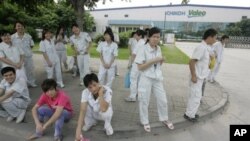Ongoing industrial unrest by factory workers in China about low pay and poor working conditions point to the emergence of an influential labor movement in the world's most-populous country.
This week, it was the Toyota workers who laid down tools and demanded higher pay. They follow workers at Honda who went out on strike and eventually received double-digit pay increases.
And, the spate of suicides at the Foxconn plant in southern China also helped focus attention on wages and conditions in Chinese factories. The scenes of striking workers at factory gates have become a regular sight in the past month.
The industrial unrest for higher pay in China poses two major questions: Does it signal the start of new era of industrial unrest and the rise of militant unionism? And, does it spell the end of cheap labor in China?
Independent labor unions have long been banned in China. The official Communist Party-controlled All-China Federation of Trade Unions has sent in officials to mediate in many of the strikes. But many workers dismiss the federation as useless. Others claim union officials have used violence and other intimidation tactics to force them back to work.
Although there is mounting evidence to suggest workers are becoming more organized and sophisticated at collective bargaining for improved welfare, it is unlikely the government would ever allow the situation to get out of hand.
Geoffrey Crothall of the Hong-Kong based China Labor Bulletin says the strikes are tolerated because they are private disputes between factory workers and factory bosses.
"The government is reasonably tolerant of labor disputes because they are disputes between management and workers. They are not a political threat and should be dealt with on a case-by-case basis," said Crothall.
The strikes have mainly hit foreign companies. This is causing problems for those manufacturers that shifted production to China to take advantage of lower labor costs and to cash in on the potential consumer market.
But, as factory bosses are forced to offer higher pay to prevent strikes, what does this mean for the faltering global economy?
The West has relied on cheap goods from China to help fuel the boom times of the past two decades. Now, it is relying on China's cheap labor and the emergence of a consumer culture to help claw the world out of the financial crisis. But some economists say the higher wages will not affect China's competitiveness, in the long term, as companies are likely to move inland to tap cheaper labor markets.
Economist Vincent Chan from Credit Suisse in Hong Kong believes the main problem for the government is to manage expectations of the second generation of migrant workers who form the back bone of China's success. And, he says this means the government will have to consider greater social services so as to keep these increasingly demanding workers content.
"It's about growing expectations. People's expectations have changed," explained Chan. "The first generation of migrant workers didn't mind living in cities. They did not mind doing overtime to earn more money to build a home back in their home village. But for this new generation of migrant workers - no way. So there are different expectations which potentially mean the government, particularly at local level, will need to provide more services to them to incorporate them into becoming urban citizens. And, that will hurt the budget."
And with increased salaries, Chinese should purchase more, helping restore parity in trade surpluses on global markets.
World Bank economist Louis Kuijs says he is not too concerned by strikes and says he does not see any signs that the industrial unrest will become a major problem for either social stability or for the Chinese and global economies.
"Wage increases in one particular factory, no matter how large, are unlikely to be representative of what's going on in the rest of the country," said Kuijs. "What we are seeing China is that wages are gradually converging to those levels in the U.S. and Europe, but this convergence is going to take a very long time."
The China Labor Bulletin's Geoffrey Crothall says the main legacy of the strikes is the media attention outside of China.
"Labor conditions in China are getting prominent coverage in the mainstream international media," noted Crothall. "So, clearly, more and more people in the West are becoming aware of conditions in Chinese factories. And, this could help put pressure on international brands to ensure those workers are treated properly and paid a decent wage."
With millions of Chinese willing to work, the country's remarkable growth looks set to continue to see more and more Chinese leaving their fields for a better paid job in the factories and a modern life in the cities. What is becoming clear however, is that Chinese workers are expecting more for their hard work. And, government officials and factory bosses, especially those who run international companies, have to address these rising expectations.











